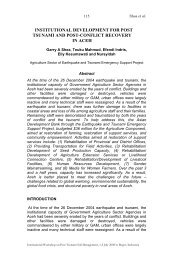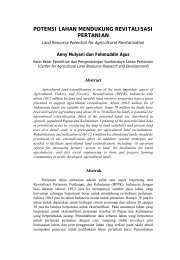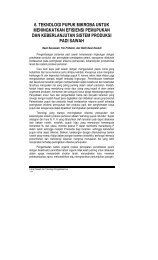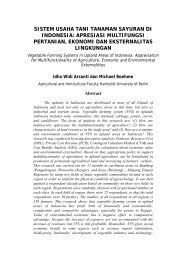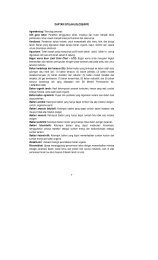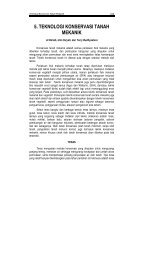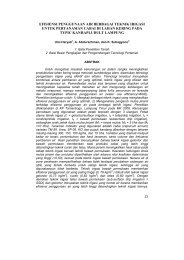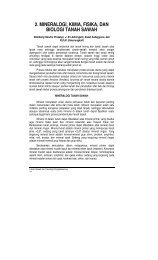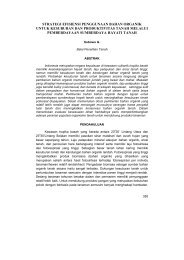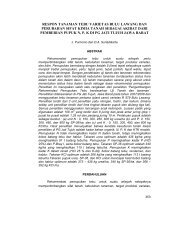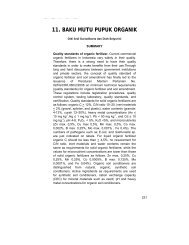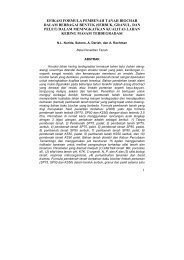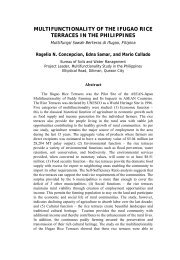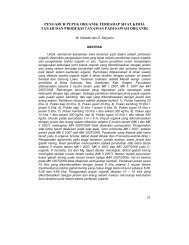Proceedings - Balai Penelitian Tanah
Proceedings - Balai Penelitian Tanah
Proceedings - Balai Penelitian Tanah
You also want an ePaper? Increase the reach of your titles
YUMPU automatically turns print PDFs into web optimized ePapers that Google loves.
97<br />
Sembiring et al.<br />
IMPLICATIONS OF SALINITY RESEARCH IN ACEH<br />
FOR INDONESIAN RICE GROWING<br />
Hasil Sembiring, Anischan Gani and T. Iskandar<br />
Indonesian Rice Research Centre (IRRC), Sukamandi, Indonesia<br />
Abstract<br />
Salinity problems have become common in recent times, due to<br />
climate change and natural disasters. Several hundred thousand<br />
hectares of irrigated land are abandoned as a result of salinisation<br />
every year. Despite the fact that salinity has been destroying the<br />
productive capacity of land in Indonesia for decades, it is only<br />
relatively recently that we have recognized the extent of the problem.<br />
However, there are fewer efforts on a national scale to slow down the<br />
process; wide areas of lowland areas along the northern coast of Java<br />
and along the western coast of Sulawesi islands were abandoned<br />
because of sea water intrusion to the inland. In addition, expertise and<br />
staff dealing with soil salinity are scarce.<br />
The tsunami of December 26, 2004 destroyed agricultural land along<br />
the western and eastern coast of NAD. As a result, many crops<br />
established and yielded poorly due to salinity, water logging, and<br />
nutrition problems. There is a need to have experienced staff available<br />
to solve problems, to transfer techniques and knowledge on salinity<br />
remediation and to evaluate management strategies which at least<br />
restore productivity to pre-tsunami levels.<br />
To solve the problems, the ACIAR project, LWR/2005/118 aimed at<br />
restoring livelihoods through the re-establishment of annual cropping<br />
– especially rice cropping, and reducing the reliance on food aid in<br />
tsunami-affected areas of NAD. Several activities have been<br />
completed for this project and some results implemented with farmers<br />
in NAD. Capacity building through workshops and training, research<br />
and variety trials – especially on rice cropping and demonstration of<br />
crop management packages have been completed and evaluated in<br />
tsunami-affected areas. Rapid progress with re-establishment of rice<br />
farming is being made in response to this project. It is proposed that<br />
similar activities would be conducted in other locations affected by a<br />
tsunami.<br />
Rice is a major food crop in Indonesia and compared with other crops<br />
such as wheat and barley, sensitivity to saline soil conditions that can<br />
dramatically reduce rice yields. Results of this project in NAD, along<br />
with the trials and communication strategies could be used in other<br />
locations affected by salinity in Indonesia, especially for rice cropping.<br />
Key words: soil salinity, tsunami-affected soil, soil and crop<br />
productivities, rice cropping<br />
International Workshop on Post Tsunami Soil Management, 1-2 July 2008 in Bogor, Indonesia



